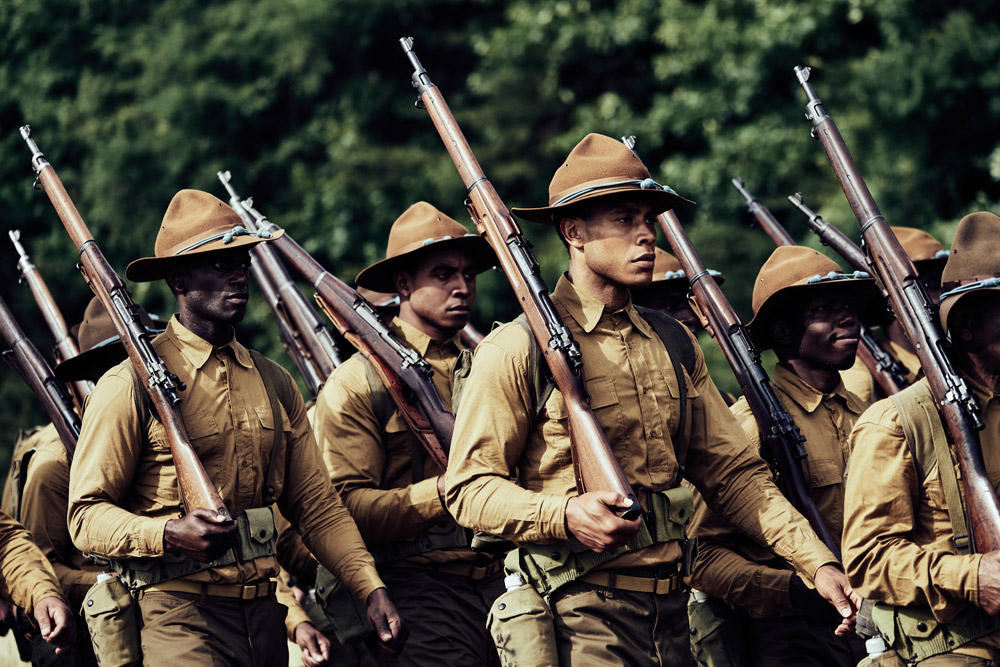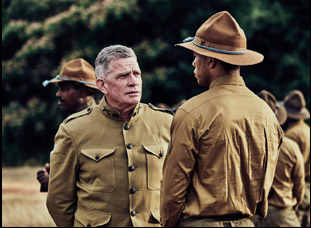Around the time that Kevin Willmott made a splash with his second feature as a director, “The Confederate States of America,” an alternative history imagining what the United States might look like if the confederacy had won the Civil War, he started thinking about making a film about war that actually happened, but few knew about as he learned more about The 24th Infantry, an all-Black battalion stationed in Houston, Texas during World War I that was eager to be deployed to fight in Europe, only to end up fighting on their own soil when the entrenched racism that prevented their travel would manifest itself into armed conflict with the locals.
“Back when I wrote it originally, that script would get me other jobs, but my agent at the time told me, “Nobody’s going to make this film,” says Willmott, of his second film this year to tackle the way in which Black Americans have been asked to serve a country in which they don’t always feel as if they’re equals, following his work co-writing Spike Lee’s Vietnam-set “Da 5 Bloods.” “[Now] I think the world was finally ready for it.”
During a summer in which the Black Lives Matter movement has come to the fore, “The 24th” is powerful in its many modern-day parallels as the battalion is asked to build the Camp Logan military base but are never made to feel as if they belong there, particularly Corporal William Boston (Trai Byers), whose sense of duty stems from reading Booker T. Washington and traveling the world rather than feeling as if it’s a last resort as it seems to be for so many in his platoon. At odds with both his peers and the white residents of Houston, who only have respect for men in uniform if they share their skin type, Boston is nonetheless tasked with keeping the peace between the army and civilians and finds a little bit of his own after meeting Marie (Aja Naomi King), who lives in town and plays a mean piano. But the détente only lasts so long when Cpl. Boston and his fellow officers begin intervening in race-related violence that doesn’t involve the military, including an unprovoked assault on a Black woman at the hands of the white cops that leads to a full-on riot in the city.
“The 24th” need not spend much time on the aftermath when it’s obvious we continue to live it to this day. But in charting the events leading up what became the largest court martial in U.S. history, resulting in 19 executions and 41 additional life sentences for the soldiers involved after taking up arms at a time when white mobs were commonly engaging in massacres across the country, Willmott illuminates class divisions within the Black community through the panoply of soldiers in the battalion and with the burgeoning romance between Boston and Marie, offers the all-too-rare sight of Black Americans enjoying life as their white counterparts would at the turn of the century, indulging in fine dining and dancing, showing the full spectrum of the Black experience at that time and the lost promise of the Reconstruction era.
At this point, the most subversive movie Willmott could make is a relatively straightforward period drama after specializing in taking unique angles towards history to bring it to life in such irreverent films as the 2009 western “The Only Good Indian,” about a school aimed at assimilating Native Americans into white culture, and “Destination Planet Negro,” in which a trio that sets their sights on Mars in 1939 to escape the Jim Crow South ends up traveling to the present day. Still, in addressing such a major event in American history that’s rarely discussed now, “The 24th” proves revelatory for other reasons and with the film now arriving in virtual cinemas after its planned premiere at SXSW earlier this year was scuttled as a result of the Coronavirus, Willmott spoke about finally getting it out to audiences after the story kicked around in his mind for so long, his collaboration with “Empire” star Byers, who he once taught at the University of Kansas where he is a professor, and finding the facts for a historical drama when history itself was written from a biased perspective.
You share a co-writing credit with Trai. What made you want him involved as a writer as much as an actor?
From the very beginning, when I first wrote it, I thought Trai would really be great as Boston and I’m so glad it happened because he just knocked it out of the park. Really what it was was I was working on “BlackKklansman” at the time and we were trying to find something to work on together and I told him, “Well, I’ve got this script and I think the romance should be heightened and I want to rewrite it, but I just don’t have time,” so I just gave it to him and he came back and really made all the changes that I would’ve made. Then we just kept rewriting it from there and it worked out great.
The character of Boston is inspired by the real life Corporal Charles Baltimore. Was he always your way into the story?
Yeah, we gave him a fictional life, but some of it was wrapped around that figure. In terms of the real incident, Baltimore was a beloved guy among the men and had a lot to do with them moving forward on marching on the city, and from what I could see, when I first wrote it years ago, I couldn’t find much about Baltimore, so from the very beginning, I fictionalized it. When Trai and I rewrote it, we really tried to connect the story] to what was going on at that time, racially and socially within the black community, the issues of light skin and dark skin and the issues of class was a defining part of that world at that time in a major way. W.E.B. DuBois’ “Talented 10 percent” notions were going on and all that was happening at that time, so it seemed like the right choice [to deal with those issues with that character].
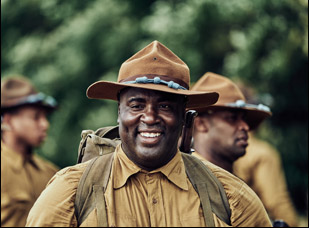
Yeah, certainly there were some Blacks at that time who did well. [Before] the Tulsa riot, African-Americans had done well there, and the same thing applied in other big cities in the South. African-Americans were starting to move toward Harlem and turn it into a black mecca in a sense. So there were clearly different classes of Black folks and I just thought that was an interesting thing for us to explore.
There’s a really lovely scene between Boston and Marie where he’s pushing her on a swing on a date, and you could argue she’s pushing him right back on some of his beliefs about the world. What was it like to break that down?
It’s tricky because obviously we wanted it to be a really romantic scene, but what does romance look like in 1917 between a Black couple? Boston is such a different person than Marie in terms of his background and his experience, so I think it worked out well because it’s a clash of not just race to some degree, but more than anything it’s a scene about class. Marie has not been exposed to anything like this before and you get the chance to see kind of what their life could be and what it will be. Life was very simple then in terms of the things you did in terms of recreation, like a swing, people would sing songs, sit on the front porch, take a stroll. Life is pretty simple, so we tried to embrace all of that.
You do take advantage of some of your actors’ musical skills – was that a requirement coming in or are you writing things in?
Well, Mykelti [Williamson] just whipped that harmonica out and laid us out with it. [laughs] That was an unexpected huge bonus for the film and he’s a great harmonica player, so any time you learn people have skills like that, it works really great in the film. Again, it’s one of those things people would do back then, so it turned out to be a terrific plus.
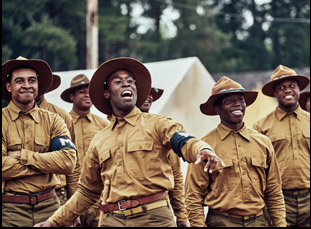
History is always very important to me and as you say, I usually try and have a lot of fun with it, but when I’m having fun with it, I always try and remain loyal to the facts, so the fun really comes from knowing the history and then making the history hopefully turn into a human story. Sometimes that can be really satirical like “Destination Planet Negro” or “CSA,” but other times, it becomes more dramatic like with “Jawhawkers” or with “The 24th,” so I take each story for what it is, in terms of what it demands and what’s important about it. Obviously, the march on Houston and the subsequent trial, that’s such an important historical event in terms of how it affected these men’s lives that you really want to be as factual and as loyal to the truth as you can.
Is it difficult to find the real history of it when the way it was covered at the time is probably biased?
There’s no doubt about it. There was one really good book about it, but a lot has come out since I originally wrote it, and we just looked at as many sources as we can for information. Then in the end, you really have to assess it for yourself. There are a lot of mysteries about what happened that night of the march. Even some kind of conspiratorial theories have come out, but Trai and I really tried to look at what facts we thought we could really count on as being objective and that’s where our choices came from.
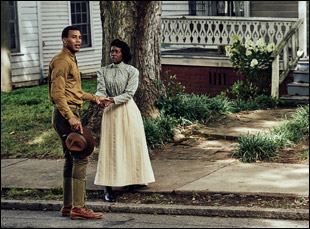
It’s funny because it’s been my experience that any time you go back specifically in Black American history to these important racial moments that are racially intense and you tell those stories, it will always link to something today. It’s just amazing how that works and the only conclusion that I think you can come to is American history is racial history. They go hand-in-hand. America is a story about race and I think we’re finally coming to terms with that, and that’s okay. Obviously, a lot of other factors are also included, but there’s a racial component to any important American story because race defines what it means to be an American, and I think “The 24th” is just an example of that.
What’s it like sending this out into the world in these strange times?
We were pretty lucky about it. The opportunity to make it came up quickly and we acted upon it and we tried to give it birth as fast as we could. I’m glad it’s coming out now, even within the pandemic, because it really speaks to what the country is going through right now and trying to come to terms with on so many levels. What it’s made me reflect on is 103 years ago, one bad policeman could destroy a city and rock a nation just like it has today. That’s just one of those truths that is part of the American story and it’s nice to see that we’re finally talking about it like we should.
“The 24th” will be available on August 21st through virtual cinemas such as Laemmle Theaters, VOD and digital.




